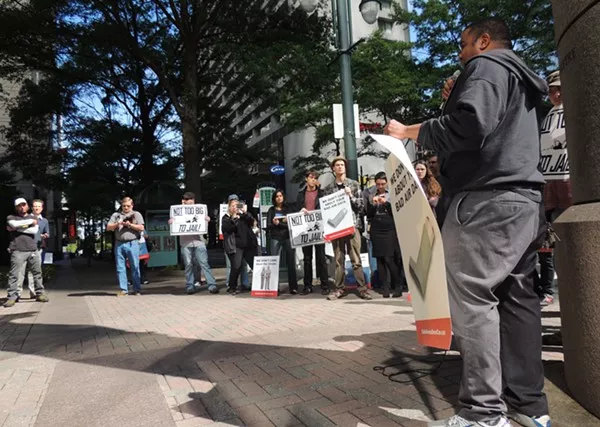Wednesday, May 8, 2013
News Students, medical professionals and environmental activists deliver united message to BofA: Stop funding coal
Posted By Ryan Pitkin on Wed, May 8, 2013 at 4:30 PM
Though there were noticeably fewer protesters at this year's Bank of America shareholder meeting than at last year's, they accomplished something their forbearers could not. The group rallied behind a single cause: climate change.
About 40 activists stood outside the meeting at the intersection of Trade and Tryon streets to speak out against Bank of America's funding of and investment in coal, as well as other BofA policies that negatively affect the environment. More than 20 activists were also inside the meeting, either as proxies for shareholders or as shareholders themselves.

- Ryan Pitkin
- Winston-Salem activist Tony Ndedge addresses the crowd.
At the 2012 meeting, protesters were split between the foreclosure crisis and the environment. This year's message could not have been more focused: stop funding coal and supporting the treacherous practice of mountaintop removal used to mine coal. More students and medical professionals were in attendance this year to help deliver that message.
Inside, a majority of questions directed at Bank of America President and CEO Brian Moynihan related to concerns about coal use, said Ashish Fernandes, an activist from India who attended the meeting. Although the bank's financing of the coal industry declined slightly last year, it remains the top financier of companies that operate coal power plants and mine for it using the environmentally destructive process of mountaintop removal.
Though Fernandes was concerned with how much action would come from the protests, he was proud of the group's showing.
"We dominated," he said. "[But Moynihan] was very dismissive. It's hard to tell how much is going in and how much is going over their head."
Sara Bahnke, a mother from the Lake Wylie area, attended the meeting because she is concerned about the two coal-ash ponds near her house. She left inspired by the presence of representatives of Brown University, Davidson University, the University of Tennessee and other schools who came to speak out against coal use. A representative of Harvard University informed Moynihan that a potential rule prohibiting Bank of America from recruiting at the university if it doesn't stop funding dirty energy was gaining support on campus.
"The overwhelming majority of questions and concerns were about clean energy," Bahnke said. "It was very powerful."
While Bahnke agrees that Moynihan could have given more feedback, she was surprised that he answered the few questions that he did. Bahnke spoke at the Duke Energy shareholder meeting last week and said CEO Jim Rogers never acknowledged questions coming from protesters.
The six activists denied access to the BofA meeting because they held anonymous passes given to them by shareholders opted instead to read their prepared statements for Moynihan to the crowd gathered outside.
MaiAda Carpano, a teacher, was one of those denied access to the meeting. She still made it clear, in her statement, that Charlotte's activist movement would not stop trying to hold Bank of America and other corporations accountable for environmentally unfriendly policies.
"I'm here because I want Bank of America to know that, here in Charlotte, we are going to fight," said Carpano. "We are not going to stop. If [Bank of America] will not have a conscience, we will be the conscience for you."
Retired nurses Terry Taylor and Mary Cappleman also addressed the crowd of protesters after being denied access to the meeting. The women represent an increased number of medical professionals who have joined the local activist movement in the last 12 months. Taylor and Cappleman signed on in the past six.
Taylor said she hopes more people who have worked in the medical field and witnessed the repercussions of pollution firsthand will join the cause.
"When the physicians tell you what they see in their office, people listen," she said. "It's more than just some stats that you would read."
Taylor said the long and often awkward schedules of most in the medical field hold physicians, nurses and others back from participating in environmental activism. She said doctors who most often encounter patients with pollution-related problems, such as lung disease specialists, have an increased workload due to the very issues she and others protested on Wednesday.
"I am 72 years old. I am retired and widowed, and I have time to speak out as much as I can about what I know," she said. "[Mary and I] plan on incorporating a lot of other medical workers, especially physicians. People listen to their doctors."
Speaking of...
Latest in The CLog
More by Ryan Pitkin
-

You're the Best... of Charlotte
Oct 27, 2018 -

Listen Up: Cuzo Key and FLLS Go 'Universal' on 'Local Vibes'
Oct 25, 2018 -

Listen Up: KANG is Back and Bla/Alt on 'Local Vibes'
Oct 18, 2018 - More »












